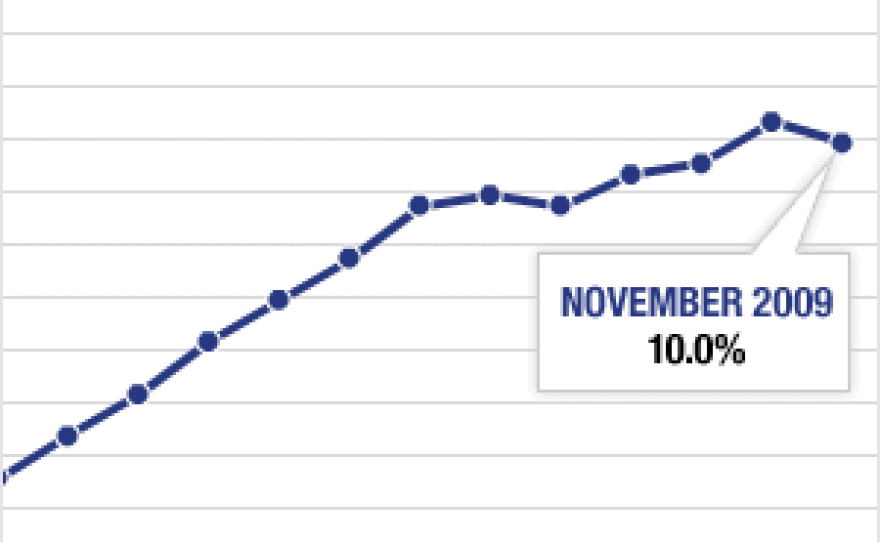In the economic plan he outlined this month, President Obama paid particular attention to small business. He announced tax cuts aimed at spurring capital investment and helping companies hire new workers.
Small businesses may be getting a break from the federal government. But at the same time, many states are preparing to impose big tax hikes by increasing unemployment insurance premiums.
'A Sour Pill'
In Florida, unemployment benefits top out at just $300 a week. But for someone who is out of a job, the money can be a godsend. Congress extended jobless benefits as part of the stimulus package and is considering passing a second extension.
Currently, nearly 700,000 people in Florida receive unemployment benefits. For employers such as Kevin Rusk, owner and founder of the Titanic Brewery and Restaurant in Coral Gables, it comes with a cost.
Rusk is one of the thousands of business owners statewide who soon will receive notice that his unemployment insurance premiums are rising — in fact, skyrocketing.
The minimum rate for employers with few claims, which was $8, is leaping to more than $100 per employee. That has left business owners like Rusk with sticker shock.
"In my business, if I said I was going to increase the price of a burger," Rusk says, "I can increase it 5 percent, 10 percent, you know? They increased it 1,200 percent, and that's just a sour pill for most people to swallow."
Overnight Growth

Florida's unemployment rate is 11.5 percent — above the national average of 10 percent, according to the Bureau of Labor Statistics. With so many people out of work in Florida, the state's unemployment fund — which a year ago had a $1 billion surplus — was quickly depleted.
A few months ago, Florida began borrowing money from the federal government. At the same time, the depleted fund triggered a provision in a state law that automatically increases premiums for business owners.
With 30 employees, Rusk's annual premiums rose from a few hundred dollars to more than $3,000. Unemployment insurance has suddenly gone from negligible to a noticeable expense, one that he says may affect business decisions.
"I can't say that I wouldn't hire another person," Rusk says, "but I'll think a little harder than I would have before."
That's the impact economists and policymakers are worried about — that the rising cost of unemployment insurance will cause business owners to tighten their belts, just as the recession appears to be easing.
"Businesses are beginning to feel a little better about the light at the end of the tunnel," says Rick McAllister, head of the Florida Retail Federation, "and we don't want them to think now that that's a train. It's a psychological defeat that would be a jobs killer and a recovery killer for the state of Florida."
No one is suggesting that unemployment benefits should be cut. But the retail federation is asking Florida legislators to put the tax increase on hold for at least a year, while businesses get back on their feet and the economy improves.
Cost To Shift From Businesses To Government
Because of the automatic trigger that raises unemployment premiums, Florida is one of the first states to feel the pain. But it will have plenty of company soon.
In my business, if I said I was going to increase the price of a burger, I can increase it 5 percent, 10 percent, you know? They increased [unemployment insurance premiums] 1,200 percent.
About 25 states have depleted their funds and have turned to the federal government for loans, borrowing some $15 billion. The U.S. Labor Department expects those numbers to grow — to include 40 states and $90 billion in loans before the jobless picture improves. That's all money that will eventually have to be paid back by business owners, through higher unemployment insurance premiums.
In many states, the crunch will come in two years, when it's time for the states to begin paying back the federal loans, says Rich Hobbie, executive director of the National Association of State Workforce Agencies.
Hobbie says that "2011 will be when most of the states that have borrowed will be facing an increase in their federal unemployment tax. And that, coupled with the increases in state unemployment taxes, will really get the interest of employers, and they'll start to advocate for change."
Currently, the government loans to the state's unemployment fund are interest-free. As the states come to grips with this problem, pressure is likely to build on Washington to extend the program or make other concessions — which will shift, at least temporarily, the rising cost of unemployment insurance from businesses to the federal government.
Copyright 2022 NPR. To see more, visit https://www.npr.org. 9(MDAzMjM2NDYzMDEyMzc1Njk5NjAxNzY3OQ001))






